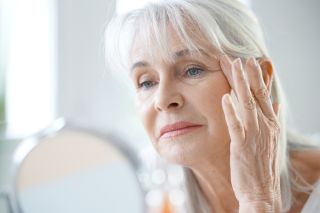Aging
Older Women See Themselves More Positively Than the Media Does
Comparing self-images from three generations of women.
Posted March 25, 2024 Reviewed by Gary Drevitch

As a powerful storytelling tool, the media shapes our perceptions and aspirations. However, when it comes to narratives about aging, there appears to be a disconnect between the stories being told and the lived experiences of women, especially older women.
According to a recent survey by AARP, the majority of women:
- feel misrepresented by mainstream media images.
- feel more comfortable in their skin as they age.
- prioritize health over conventional beauty standards.
- challenge the relevance of the term “old."
Let’s explore how women view themselves in contrast to their portrayal in media and why it matters.
Misrepresentation by mainstream media images
Regardless of their age, 75% of women generally wished ads had more realistic representations of women. And 75% of women also reported that they feel positively toward ads featuring and celebrating women of various ages – with 66% of Boomer women (54-72) saying they did not feel represented in media imagery of women.
The study found that 50% of women are “annoyed” by heavily airbrushed magazine covers, and 41% are “comforted” by images of “imperfect” women. Of all women, 41% endorsed the statement, “My perception of my imperfections is magnified when I compare myself to images of women in media.”
Women across generations agree that age does not define beauty; 61% believe they are beautiful at any age. Few (29%) say their greatest anxiety about aging is their appearance; 76% of women accept their age; and 60% say they embrace it. This self-acceptance is powerful, liberating women from unrealistic and narrow standards of beauty perpetuated by the media and advertising. There appears to be a sense of resilience and healthy skepticism about media influence that grows stronger with age.
Older women are more comfortable in their own skin
- 52% of Boomers agreed with the statement, “I am kinder to myself about my body image as I age"; only 41% of Gen Xers and 38% of Millennials agreed with this.
- 51% of Boomers agreed with the statement “I do not have a negative body image,” compared to only 44% of Gen Xers and Millennials.
- 61% of Boomers, Gen Xers, and Millennials agreed, “I feel free to dress how I want."
Millennials’ emotions are affected more by social media than older generations. Among women who post selfies with filters, Millennials are affected more (both positively and negatively) than Gen Xers and Boomers.
- The statement “My confidence is boosted by getting “likes” on social media” was endorsed by 29% of Millennials and 21% of Gen Xers, but only 14% of Boomers.
- 31% of Millennials believe “Selfies with filters make me feel better about my looks"; 24% of Gen Xers and 13% of Boomers agreed.
- 27% of Millennials, and 21% of Gen Xers, reported, “Social media makes me feel insecure about my appearance. Only 11% of Boomers feel that way.
All Women prioritize health over conventional beauty standards.
Women are more concerned with maintaining their health than their physical beauty as they age: 74% say they are concerned with staying healthy as they age. It should be noted that there was only a slight increase in the older age groups. On average, 64% of women said they would rather be strong and healthy than their ideal height or weight, and 65% of women said their greatest anxiety about aging is the health issues (and not appearance issues). Also, 61% said they feared declining health more while 35% who feared death more.
Questioning the relevance of the term “old”
Women are redefining what it means to grow older and challenging the media to keep pace with their evolving perceptions. “Old” is becoming obsolete, a word that refers to someone else, not them. On average, women believe “old age” begins at 70 and “middle age” begins at 47. When analyzed by age group, Boomers believed “old age” started at 74, Gen Xers at 70, and Millennials at 44. Boomers believed “middle age” began at 51, Gen Xers at 47, and Millennials at 44.
Among Boomers (age 54-72), 78% considered themselves middle-aged, suggesting that they expect to live longer lives. Thus, women generally view the term “old” as a moving target that often refers to someone a generation ahead rather than to themselves. This is not just a matter of semantics but a reflection of how they feel, irrespective of the number of birthdays celebrated. This perspective disrupts the traditional narrative that equates aging with declining relevance and vitality.
Wangler and Jansky (2023) conducted a study to test directly how exposure to age-related media images affects older adults. For the study, 910 participants (aged 60 and older) were exposed to different age frames during a quasi-experimental survey. To follow-up, 36 focused interviews were conducted with older adults, each presented with an age frame to substantiate the results. The survey results showed that presenting a negative age frame improved participants’ self-image, whereas their general conception of old age deteriorated significantly. After delivering a positive frame, their general concept of aging was enhanced considerably while their self-image decreased.
The interviews confirmed these results. Interviewees did not relate to the older people portrayed, and their personal aging often felt at odds with the portrayal of age shown. The positive frame was first received with pleasure and curiosity. Even so, interviewees became unsettled about how positive aging was portrayed. Some participants expressed insecurity that they could not fulfill the characteristics and requirements of the positive ideal of aging.
The findings shed light on how social comparison processes work: Individuals feel better when they compare themselves to a negative image and feel more uneasy when comparing themselves to a positive ideal image. Social comparison effects may explain why Boomer women report being less affected by negative stereotypical images in the media: They may be annoyed, but negative images are less likely to shake their confidence because they don’t identify with them.
Copyright 2024 Tara Well, Ph.D.
References
Thayer, Colette. (2018) Mirror/Mirror: AARP Survey of Women's Reflections on Beauty, Age, and Media. Washington, DC: AARP Research, October, 2018. https://doi.org/10.26419/res.00250.001
Wangler, J., Jansky, M. (2023). Media portrayal of old age and its effects on attitudes in older people: findings from a series of studies. Humanities and Social Science Communications 10, 165. https://doi.org/10.1057/s41599-023-01671-5




